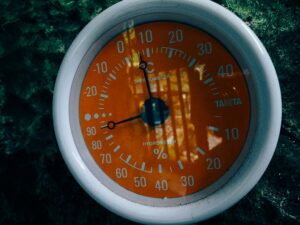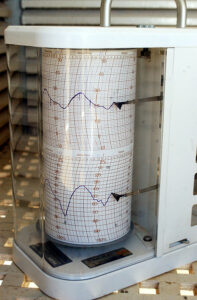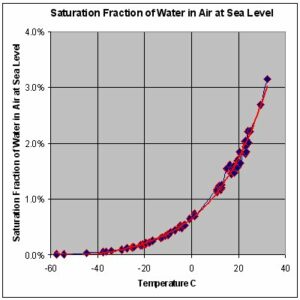In this article the topic is “Specific humidity vs. relative humidity” and specific humidity vs. relative humidity related facts and relationship will be prate in a brief manner.
Specific humidity is a physical parameter by which express as the ratio between the mass of the water vapor and net moist mass of the air parcel. Relative humidity derives as in a particular temperature the portion to reveal a present state of absolute humidity comparative to a maximum humidity.
How to determine the specific humidity to relative humidity:
Determination of the specific humidity to relative humidity is discuss below,
Relative humidity can be express as e/e0 and derive as, the proportion of the vapor pressure to the pressure of the saturation vapour. In other word the proportion of mass compound proportions of vapor of water at practical and saturation values and express as, w/ws. If the value of the specific humidity is know then compound mixing proportion of the vapor of water in air can be written as,
q ≡ mv/mv+md = w/w+1 ≈ w
Relative humidity can be derive as, the proportion of the vapor of water compound proportion to vapor of water compound proportion w/ws \\frac{w}{w_s}
Where,
ws ≡ mvs/md = esRd/Rv (p-es) ≈ 0.622es/p
And from the Clausius – Clapeyron equation we can write,
When the value of w and w_s is obtained in that case we can write,
RH = 100w/ws ≈ 0.263pq[exp(17.67(T-T0)/T-29.65)]
We also can calculate the value using this equation,
RH = 100e/es
But with this equation problems can be arise just because q is not straightforward.
The variables are used in this equation are given below,
q = Specific humidity or mass compound proportion of the vapor of the water to total amount of air and it is dimensionless
T = Temperature and unit is Kelvin
mv= Specific mass of the vapor of the water and unit is kilogram
md = Specific mass of the air which is dry and unit is kilogram
w = Mass compound proportion of the vapor of the air which is dry and it is dimensionless
mvs = Specific mass of the vapor of the water at equilibrium and unit is kilogram
ws= Mass compound proportion of the vapor of the air which is dry at equilibrium and it is dimensionless
[ Lv= Specific enthalpy for the vaporization and unit is Joule per kilogram per Kelvin
Rd= Specific gas constant of the air which is dry and unit is Joule per kilogram per Kelvin
Rv= Specific gas constant of the vapor of the water and unit is Joule per kilogram per Kelvin
es= Saturation pressure of the vapor at T and unit is Pascal
es0= Saturation pressure of the vapor at T0 unit is Pascal
p = Pressure and unit is Pascal

Define major points for the specific humidity vs relative humidity:
Humidity is the amount of vapor of the water which is present in the air. Humidity can be derive as, relative value, specific value and absolute value.
The difference between specific humidity and relative humidity is describe below,
When the value of relative humidity is known of the air which is most and the density of the vapor of the water, and the density of the vapor of the air in that particular case the specific humidity can be written as,
x = 0.622φρws/ρ-ρws x 100%
Where,
x = Specific humidity of the vapor of the air compound
φ= Relative humidity
ρws= Densisity of the vapor of the water and unit is kilogram per cubic meter
ρ= Density of the vapor of the humid air and unit is kilogram per cubic meter
What is the specific humidity?
The unit of the specific humidity is most useful unit of the dimension of the humidity.
Specific humidity can be derive as, the total mass of the vapor of the water in a unit mass o the air of the moist. In air conditioning system the specific humidity can be express as, grains per pound and usually the specific humidity can be express as vapor of the air in kilogram.
The equation of the specific humidity is,
SH = 0.622 x P/P-Pw x 100%
Where,
SH = Specific humidity or mass compound proportion of the vapor of the water to total amount of air and it is dimensionless
P = Pressure and unit is Pascal
Pw= Pressure pressure of the vapor of the water and unit is Pascal
As temperature decreases, the amount of water vapor needed to reach saturation also decreases and as temperature increases, the amount of water vapor needed to reach saturation also increases. As the temperature of a parcel of air becomes lower it will eventually reach the point of saturation without adding or losing water mass.
How to calculate specific humidity with temperature, relative humidity and pressure?
Determine the specific humidity with temperature, relative humidity and pressure is describe below,
If the equation the value of Relative humidity is given in that case the value of temperature and pressure easily can be calculate using this equation,
RH = e/es
w = eRd/Rv(p-e)
And,
q = w/w+1
After that we can estimate the value of specific humidity which is express as q. The value of specific humidity can be estimate using this equation,
From the equation of e = RH \\times e_s we can estimate the value of e and then value of the e is plug into the equation for w. Then putting the value of the result into the equation for q.
The variables are used in this equation are given below,
q = Specific humidity or mass compound proportion of the vapor of the water to total amount of air and it is dimensionless
w = Mass compound proportion of the vapor of the air which is dry and it is dimensionless
es= Saturation pressure of the vapor at T and unit is Pascal
es0= Saturation pressure of the vapor at T0unit is Pascal
Rd= Specific gas constant of the air which is dry and unit is Joule per kilogram per Kelvin
Rv= Specific gas constant of the vapor of the water and unit is Joule per kilogram per Kelvin
p = Pressure and unit is Pascal
Lv= Specific enthalpy for the vaporization and unit is Joule per kilogram per Kelvin
T = Temperature and unit is Kelvin
T0= Reference temperature and unit is Kelvin

How to find specific humidity from dew point?
Dew point can be derive as in this way the fixed temperature at which vapor of the water start to condense in to water.
Finding the specific humidity from dew point is given below,
The variables are used in this equation are given below,
Ts= Dew point
b = Magnus coefficient
a = Magnus coefficient
T = Temperature
RH = Relative humidity of the air

Image Credit – Wikipedia
How to calculate maximum specific humidity?
The calculation of the maximum specific humidity is discuss below,
At the beginning of the process of calculation of the specific humidity need to measure the net amount of pressure for the air.
In the next step of the calculation of the specific humidity need to determine the partial pressure for the vapor of the water.
In final step using the specific humidity equation put the value of pressure for the air and partial pressure for the vapor of the water and determines the value.
The equation of the specific humidity is,
SH = 0.622 x P/P-Pw x 100%
Where,
SH = Specific humidity or mass compound proportion of the vapor of the water to total amount of air and it is dimensionless
P = Pressure and unit is Pascal
Pw= Pressure pressure of the vapor of the water and unit is Pascal
Frequent asked question:-
Question: – Write down the conditions which are most preferred for the dew points.
Answer: – The conditions which are most prefer for the dew points is listed below,
- Clear sky at the night time particularly a day after warm
- Little amount of vapor of the water at the higher surrounding
- If no strong wind is not present in the night time means calm night
- In the lower tier of the higher humidity
Question: – Write down the structures which are most preferred for the dew points.
Answer: – The structures which are most preferred for the dew points are listed below,
- Good radiators
- Poor thermal conductivity
- Exposed and thin matters such as petals, grass blades and leaves
- Well isolated from the surface
Hi..I am Indrani Banerjee. I completed my bachelor’s degree in mechanical engineering. I am an enthusiastic person and I am a person who is positive about every aspect of life. I like to read Books and listen to music.